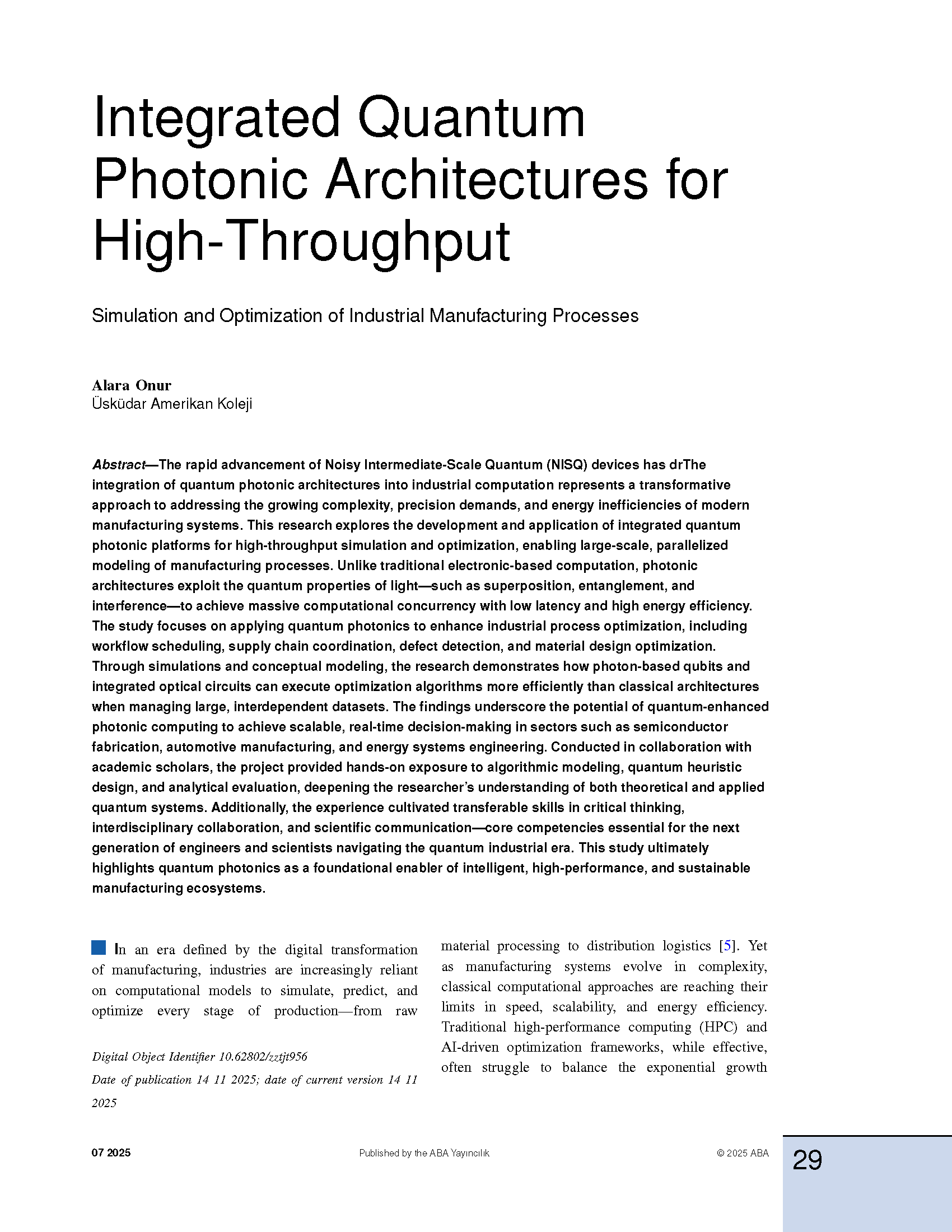Integrated Quantum Photonic Architectures for High-Throughput Simulation and Optimization of Industrial Manufacturing Processes
DOI:
https://doi.org/10.62802/zztjt956Keywords:
quantum photonics, integrated photonic circuits, industrial optimization, high-throughput simulation, quantum-enhanced manufacturing, scalability, quantum optics, computational efficiencyAbstract
The integration of quantum photonic architectures into industrial computation represents a transformative approach to addressing the growing complexity, precision demands, and energy inefficiencies of modern manufacturing systems. This research explores the development and application of integrated quantum photonic platforms for high-throughput simulation and optimization, enabling large-scale, parallelized modeling of manufacturing processes. Unlike traditional electronic-based computation, photonic architectures exploit the quantum properties of light—such as superposition, entanglement, and interference—to achieve massive computational concurrency with low latency and high energy efficiency. The study focuses on applying quantum photonics to enhance industrial process optimization, including workflow scheduling, supply chain coordination, defect detection, and material design optimization. Through simulations and conceptual modeling, the research demonstrates how photon-based qubits and integrated optical circuits can execute optimization algorithms more efficiently than classical architectures when managing large, interdependent datasets. The findings underscore the potential of quantum-enhanced photonic computing to achieve scalable, real-time decision-making in sectors such as semiconductor fabrication, automotive manufacturing, and energy systems engineering. Conducted in collaboration with academic scholars, the project provided hands-on exposure to algorithmic modeling, quantum heuristic design, and analytical evaluation, deepening the researcher’s understanding of both theoretical and applied quantum systems. Additionally, the experience cultivated transferable skills in critical thinking, interdisciplinary collaboration, and scientific communication—core competencies essential for the next generation of engineers and scientists navigating the quantum industrial era. This study ultimately highlights quantum photonics as a foundational enabler of intelligent, high-performance, and sustainable manufacturing ecosystems.
References
Bente, I., Taheriniya, S., Lenzini, F., Brückerhoff-Plückelmann, F., Kues, M., Bhaskaran, H., ... & Pernice, W. (2025). The potential of multidimensional photonic computing. Nature Reviews Physics, 7(8), 439-450.
Bhowmick, K., & Awotunde, J. B. (2025). Optical and Quantum Computing in Industry 4.0 and Industry 5.0. In Computational Intelligence for Analysis of Trends in Industry 4.0 and 5.0 (pp. 373-398). Auerbach Publications.
Columbus Chinnappan, C., Thanaraj Krishnan, P., Elamaran, E., Arul, R., & Sunil Kumar, T. (2025). Quantum Computing: Foundations, Architecture and Applications. Engineering Reports, 7(8), e70337.
Cuomo, M. T., & Foroudi, P. (2025). Tools and Techniques for Quantum Business. In Quantum Level Business Model: A New Managerial Perspective (pp. 83-104). Cham: Springer Nature Switzerland.
De Felice, F., De Luca, C., Petrillo, A., Forcina, A., Ortiz Barrios, M. A., & Baffo, I. (2025). The Role of Digital Transformation in Manufacturing: Discrete Event Simulation to Reshape Industrial Landscapes. Applied Sciences, 15(11), 6140.
Hullurappa, M., & Panyaram, S. (2025). Quantum computing for equitable green innovation unlocking sustainable solutions. In Advancing social equity through accessible green innovation (pp. 387-402). IGI Global Scientific Publishing.
Pradas Gómez, A., Panarotto, M., & Isaksson, O. (2025). FUSE: A Novel Design Space Exploration Method for Aero Engine Components That Combines Functional and Physical Domains. Aerospace, 12(1), 51.
Subashree, S., Akila, T., Dwaramwar, P. A., Chandra, S., & Kshirsagar, K. P. (2025). AI-Driven Energy Optimization in High-Performance Computing: Smart Solutions for Sustainable Efficiency. Integrating Machine Learning Into HPC-Based Simulations and Analytics, 277-302.
Wang, H., Ralph, T. C., Renema, J. J., Lu, C. Y., & Pan, J. W. (2025). Scalable photonic quantum technologies. Nature Materials, 1-15.









